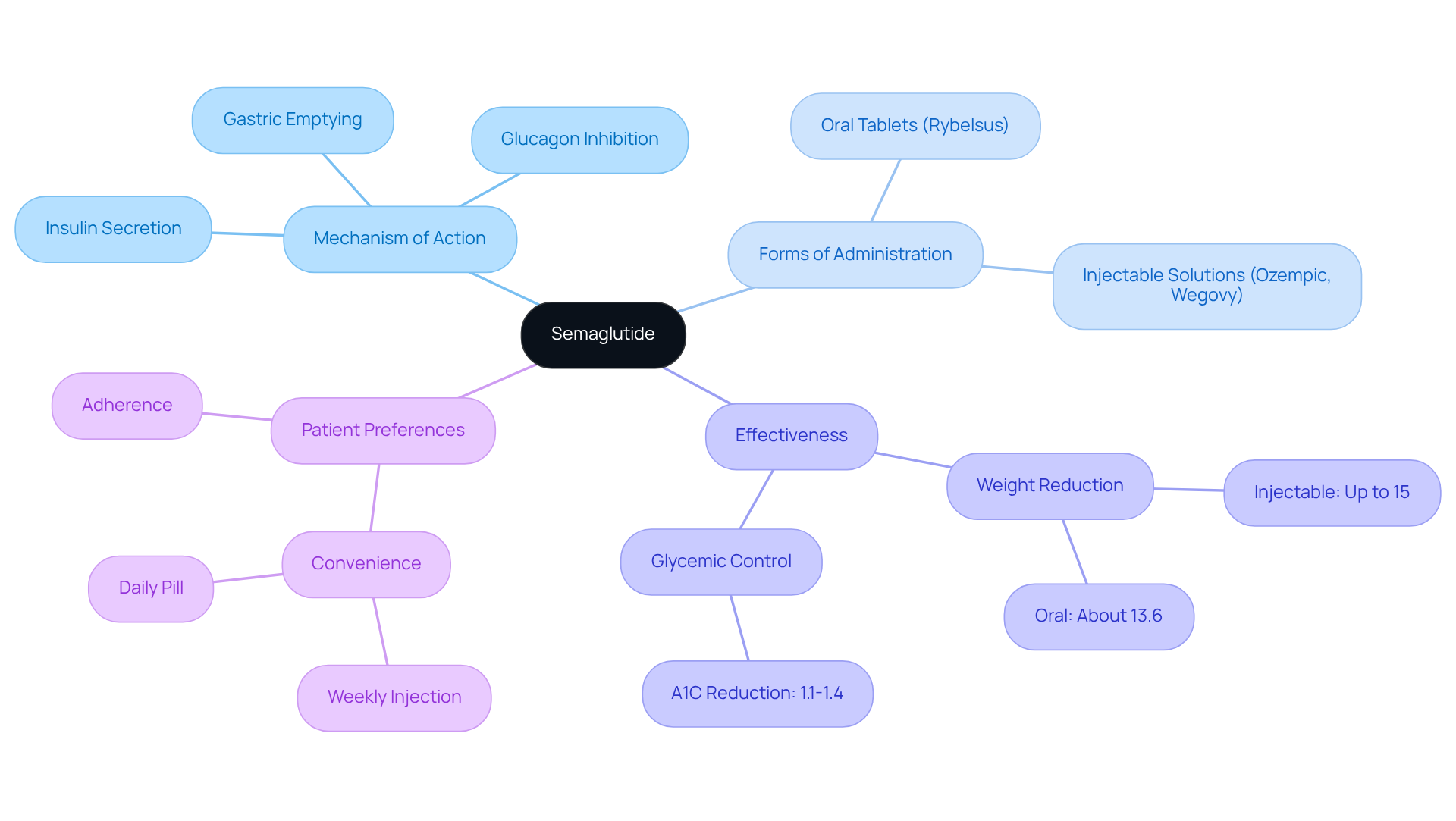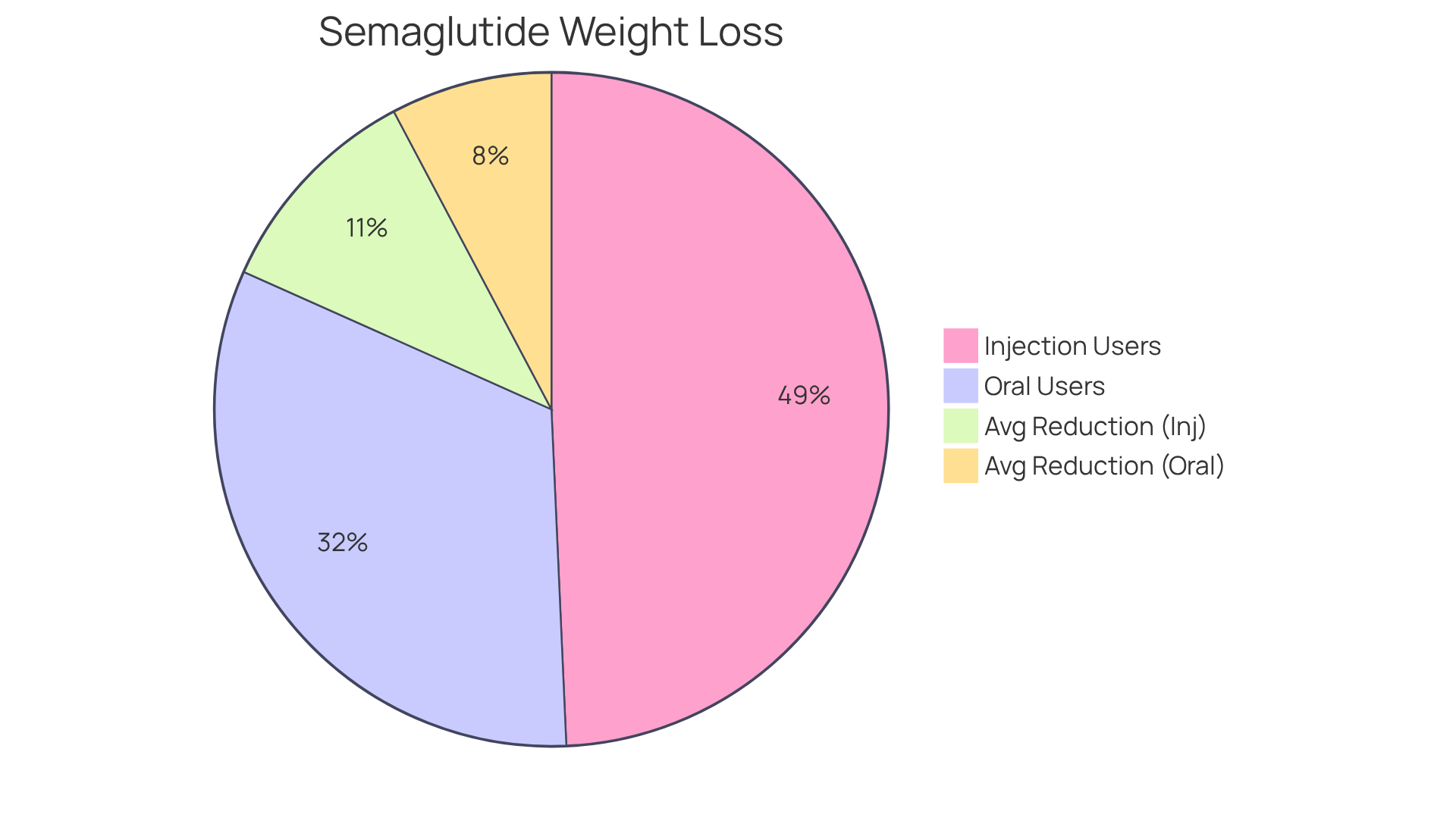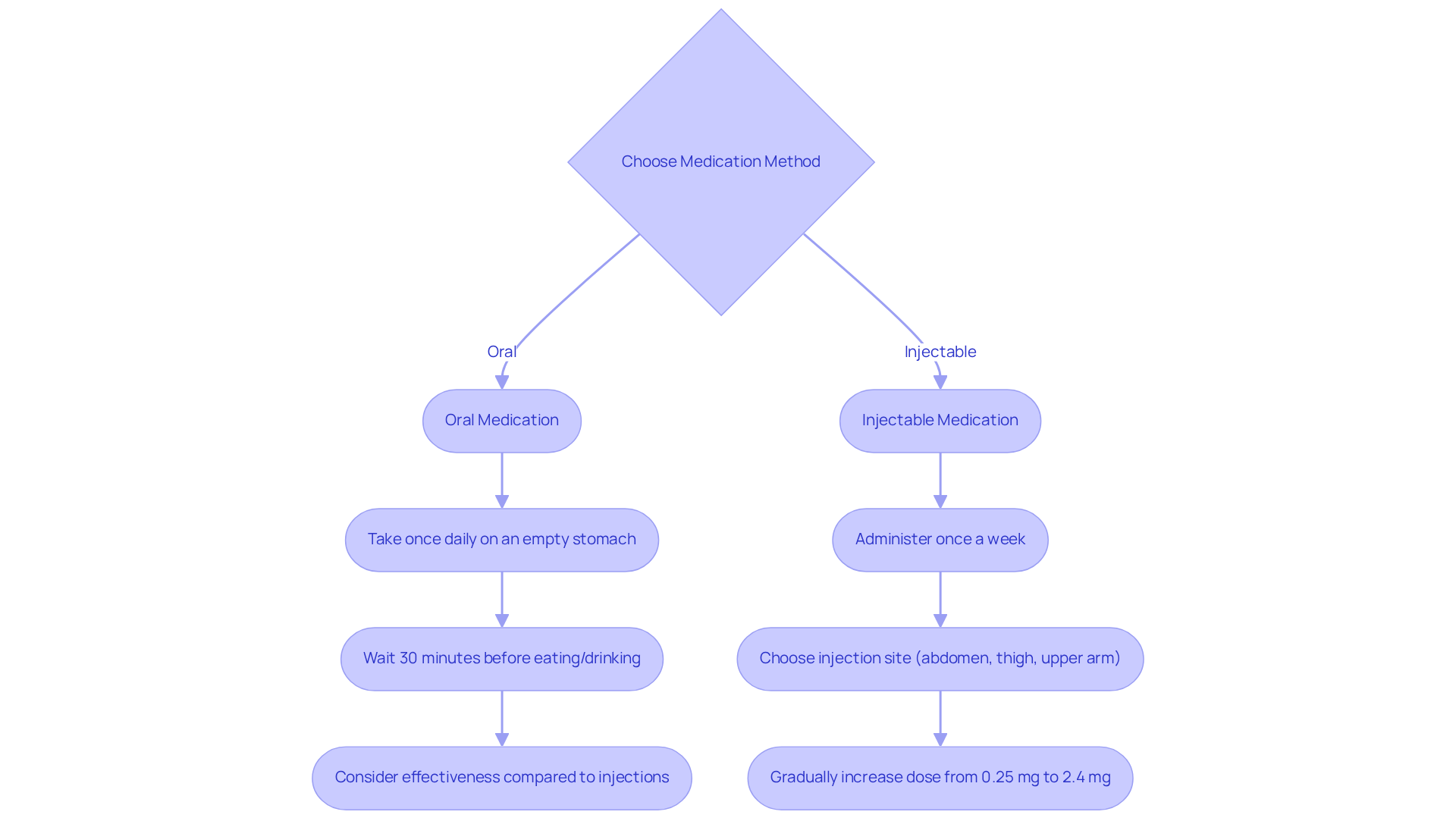Introduction
The rise of semaglutide as a weight loss aid has sparked a significant debate among patients and healthcare professionals alike. We understand that navigating weight management can be challenging, and with two forms available – oral tablets and injectable solutions – individuals often face the dilemma of choosing the most effective option for their journey.
This article delves into the comparative effectiveness of semaglutide pills versus injections. We’ll examine not only the results they yield but also the personal preferences and lifestyle factors that influence this choice. Are semaglutide pills truly as effective as their injectable counterparts? Or do they fall short in delivering the desired outcomes?
You’re not alone in this journey, and the answers may surprise those seeking a tailored approach to their health goals. Let’s explore these options together, ensuring you feel supported every step of the way.
Understanding Semaglutide: Mechanism and Forms
Semaglutide, a glucagon-like peptide-1 (GLP-1) receptor agonist, mimics the effects of the GLP-1 hormone, which is naturally released in the gut after eating. We understand that managing weight and health can be challenging, and this medication offers a supportive solution. It enhances insulin secretion, inhibits glucagon release, and slows gastric emptying, collectively reducing appetite and promoting satiety.
Offered in two main types – oral tablets (Rybelsus) and solution for injection (Ozempic and Wegovy) – Semaglutide provides flexibility in administration. The oral version is taken daily, requiring strict adherence to timing for optimal absorption. In contrast, the injected variant is administered weekly, which can be more convenient for those who prefer less frequent dosing.
Studies show that Semaglutide administered via injection can result in an average reduction of up to 15% over a year, whereas the pill form generally leads to a decrease of around 13.6%. Both formulations have shown significant improvements in glycemic control, with reductions in A1C levels of about 1.1-1.4% after six months. However, it’s important to note that the injected form has demonstrated superior effectiveness in decreasing body mass, BMI, and waist size, raising the question of whether semaglutide pills are as effective as injections.
Patient preferences often play a crucial role in the choice between these two forms. Some individuals may favor the convenience of a weekly injection, while others might opt for the daily pill despite its strict administration requirements. You’re not alone in this journey; many face similar decisions. Ultimately, the effectiveness of Semaglutide raises the question of whether semaglutide pills are as effective as injections, underscoring the importance of personalized treatment plans that align with your health goals and lifestyle needs. Remember, finding the right approach for you is key to achieving your desired outcomes.

Comparing Effectiveness: Oral vs. Injectable Semaglutide for Weight Loss
We understand that managing weight can be a challenging journey, and it’s important to find the right approach that works for you. Clinical studies have shown that while both pill and injection forms of semaglutide can be effective in reducing body mass, the question remains: are semaglutide pills as effective as injections, given that they yield different results that might resonate with your experience?
Individuals using semaglutide via injection have reported an average reduction of about 15% in their body mass over 68 weeks. In contrast, those opting for the pill form typically see a decrease of around 10-12% within similar timeframes. This difference can be significant, especially when you’re striving for substantial weight loss.
Moreover, a recent study revealed that:
- 70% of those using injections achieved at least a 10% decrease in body mass
- Approximately 46% of oral users achieved the same
This suggests that while both formulations have their advantages, it raises the question of whether semaglutide pills are as effective as injections, as the injection variant may provide better outcomes for those looking to make a more considerable change.
However, it’s essential to remember that individual responses can vary based on adherence to treatment and lifestyle factors. You’re not alone in this journey, and personalized approaches to weight management can make a real difference. We encourage you to explore what works best for you, as every step you take is a step toward a healthier you.

Evaluating Side Effects: Oral and Injectable Semaglutide
Both injectable and oral medications can lead to gastrointestinal side effects, such as nausea, vomiting, and diarrhea. We understand that these issues can be concerning, and it’s important to know that the incidence and severity of these effects can differ between the two formulations.
Injectable medications often present a higher frequency of gastrointestinal problems, especially during the initial weeks of treatment. In contrast, while oral medications may result in milder symptoms, some patients question whether semaglutide pills are as effective as injections due to variability in absorption from food interactions. Studies indicate that negative occurrences related to gastrointestinal issues occurred in 16.7% of patients using the tablet version, compared to 4.9% in those opting for the injection form.
Healthcare professionals emphasize the importance of monitoring these side effects, as they can significantly impact treatment adherence and overall patient satisfaction. You’re not alone in this journey; patient testimonials reveal a range of experiences. Some individuals report manageable side effects with oral medication, while others question if semaglutide pills are as effective as injections, despite the gastrointestinal challenges.
Ultimately, it’s essential for patients to engage in open discussions with their healthcare providers. Tailoring treatment plans according to specific needs and experiences can make a significant difference in your journey towards better health.

Administration and Dosage: Practical Insights for Patients
We understand that managing medication can feel overwhelming at times. Oral medication, taken once daily on an empty stomach with a full glass of water, offers a convenient option for many. Patients should wait at least 30 minutes before eating or drinking anything else. This regimen can be especially appealing for those who prefer not to use injections, prompting the question of whether semaglutide pills are as effective as injections, while allowing for a personalized approach to weight management that fits individual lifestyles.
In addition, for those who opt for the injectable route, the medication is administered once a week through a subcutaneous injection in the abdomen, thigh, or upper arm. While some may initially find the injection process intimidating, many report that it becomes easier with practice. This gradual adjustment can significantly contribute to their overall well-being.
The starting dose for injectable semaglutide is typically 0.25 mg, which is gradually increased to a maximum of 2.4 mg per week. For patients, understanding whether semaglutide pills are as effective as injections is crucial. You’re not alone in this journey; knowing how to use your medication properly can help maximize the effectiveness of your personalized treatment. Remember, we’re here to support you every step of the way.

Conclusion
When it comes to weight loss solutions, the effectiveness of semaglutide-whether in oral pills or injectable forms-raises important considerations. We understand that choosing the right option can feel overwhelming, but both formulations have shown to be beneficial. Interestingly, the injectable version tends to demonstrate slightly higher efficacy in reducing body mass, which highlights the importance of making personalized treatment choices that align with your preferences and health goals.
Key insights reveal that injectable semaglutide generally leads to greater weight loss compared to its oral counterpart. Clinical studies indicate an average reduction of about 15% with injections, while pills typically result in approximately 10-12%. Moreover, the side effects associated with both forms can vary; injections often lead to fewer gastrointestinal issues than the oral version. This information underscores the importance of understanding the advantages and challenges of each option.
Ultimately, the decision between semaglutide pills and injections should be guided by your lifestyle, comfort with administration methods, and specific health objectives. You’re not alone in this journey-engaging in thorough discussions with healthcare providers can foster a tailored approach to weight management. This ensures that you embark on a path that aligns with your unique needs and aspirations.
Remember, the journey to achieving weight loss goals is not one-size-fits-all. Exploring the most suitable option for you can significantly enhance your chances of success. We’re here to support you every step of the way.
Frequently Asked Questions
What is Semaglutide and how does it work?
Semaglutide is a glucagon-like peptide-1 (GLP-1) receptor agonist that mimics the effects of the GLP-1 hormone, which is released in the gut after eating. It enhances insulin secretion, inhibits glucagon release, and slows gastric emptying, which collectively reduces appetite and promotes feelings of fullness.
What forms of Semaglutide are available?
Semaglutide is available in two main forms: oral tablets (Rybelsus) and a solution for injection (Ozempic and Wegovy).
How is the oral form of Semaglutide taken?
The oral form of Semaglutide is taken daily and requires strict adherence to timing for optimal absorption.
How often is the injected form of Semaglutide administered?
The injected form of Semaglutide is administered weekly, which can be more convenient for those who prefer less frequent dosing.
What are the average weight loss results from using Semaglutide?
Studies show that Semaglutide administered via injection can result in an average weight reduction of up to 15% over a year, while the pill form generally leads to a decrease of around 13.6%.
How does Semaglutide affect glycemic control?
Both formulations of Semaglutide have shown significant improvements in glycemic control, with reductions in A1C levels of about 1.1-1.4% after six months.
Which form of Semaglutide is more effective for weight loss?
The injected form of Semaglutide has demonstrated superior effectiveness in decreasing body mass, BMI, and waist size compared to the oral form.
How do patient preferences influence the choice between the two forms of Semaglutide?
Patient preferences play a crucial role in the choice between the two forms; some individuals may prefer the convenience of a weekly injection, while others might opt for the daily pill despite its strict administration requirements.
Why is it important to consider personalized treatment plans with Semaglutide?
Personalized treatment plans are important as they align with individual health goals and lifestyle needs, helping to ensure the right approach is taken for achieving desired outcomes.




